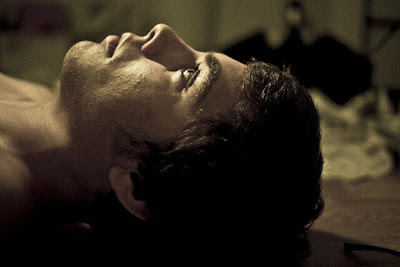Definition of Insomnia
Insomnia is a sleep disorder that causes the sufferer sleeplessness, or not getting enough sleep, though there is enough time to do it. The disorder causes sufferers of conditions not primed to do activities the next day.
The quality and quantity of sleep affect quality of life, as well as a person's overall health. Not enough sleep will cause physical and mental disorders. In General, need 8 hours of sleep in a day to maintain body condition remain fit.
There are two types of insomnia, namely primary and secondary insomnia insomnia. Primary insomnia is insomnia that is not associated with other medical conditions. While secondary insomnia insomnia is caused by another health disorders, such as arthritis, asthma, depression, cancer, or stomach acid reflux (GERD). Secondary insomnia can also be caused by the consumption of drugs or alcohol.
The quality and quantity of sleep affect quality of life, as well as a person's overall health. Not enough sleep will cause physical and mental disorders. In General, need 8 hours of sleep in a day to maintain body condition remain fit.
There are two types of insomnia, namely primary and secondary insomnia insomnia. Primary insomnia is insomnia that is not associated with other medical conditions. While secondary insomnia insomnia is caused by another health disorders, such as arthritis, asthma, depression, cancer, or stomach acid reflux (GERD). Secondary insomnia can also be caused by the consumption of drugs or alcohol.
Symptoms Of Insomnia
Symptoms of insomnia is quite diverse, and can take place in a matter of months even years. In General, insomniacs are having trouble sleeping or waking up often during the night, waking up too early in the morning, and slept soundly that feels no or not enough. A number of these symptoms can trigger symptoms, such as sleepy or tired during the day, irritability and depression, as well as the difficult focus in activity.
Insomnia can last a short (acute), or occur in the long term (chronic). Acute insomnia lasts one night to several weeks. While chronic insomnia occurs at least 3 nights a week, and take place in a matter of months.
Insomnia can last a short (acute), or occur in the long term (chronic). Acute insomnia lasts one night to several weeks. While chronic insomnia occurs at least 3 nights a week, and take place in a matter of months.
Complications Of Insomnia
The quality and quantity of sleep, it is important for the mental and physical health. Therefore, the quality of life of sufferers of insomnia generally decline, caused by a lack of concentration at the moment of activity. Risk of accidents also increased, due to the lack of focus in driving. In addition, insomnia can also affect memory and passion for sex drive.
Other complications that can occur in people with insomnia include:
Other complications that can occur in people with insomnia include:
- Physical disorders – asthma, excess weight, diabetes, seizures, heart disease, stroke, and high blood pressure.
- Mental disorders – depression, frustration, and anxiety.
Causes and Risk factors for Insomnia
Causes of Insomnia
Insomnia can be caused by many things. One of the causes of insomnia is triggered by stress. For example because it is too think about job, health, or finances. Stress can also be caused by events such as grief, illness or death that befalls the couple and family close.
The other thing that can cause insomnia include:
- Disorders of psychology, among others:
- Anxiety disorders, such as panic disorder and post traumatic stress (PTSD).
- Disorders of psychosis, such as schizophrenia.
- Mood disorders, such as depression or bipolar disorder.
- Health disorders, including:
- Hormonal disorders, such as hyperthyroidism.
- Heart disorders, such as heart failure and angina.
- Muscle and joint disorders, such as arthritis (arthritis).
- Disorders of the urinary organs, such as the enlargement of the prostate or incontinence of urine.
- Digestive disorders, such as GERD
- Respiratory disorders, such as asthma and chronic obstructive pulmonary disease.
- Nervous disorders, such as Parkinson's disease or Alzheimer's.
- Sleep disorders, such as restless leg syndrome, sleep apnea, and narcolepsy.
- Diabetes.
- Cancer.
- Unhealthy lifestyles, like smoking, abusing DRUGS, and consuming of alcoholic or caffeinated.
- The drugs, including:
- Antidepressants such as fluoxetine, and
- Medications, such as ibuprofen nonsteroid bitter taste.
- Asthma medications, such as salbutamol, salmeterol, and teofilin.
- Anti drug seizures.
- The drug stimulant methylphenidate, for example to deal with disorder hyperactivity (ADHD) or modafinil to treat narcolepsy.
- High blood pressure medication, such as an inhibitor of beta.
- Environmental factors, such as noise, the lights are too bright, as well as the temperature is too cold or too hot, so that it can interfere with sleep.
Risk Factors For Insomnia
Although everyone may experience insomnia, there are several factors that can increase the risk of the occurrence of this condition. Among these are:
- Women-sex. Hormonal changes during the menstrual period and menopause can interfere with sleep patterns. In addition, insomnia can also occur during pregnancy.
- Above 60 years of age. Health conditions and sleep patterns change over the ages, and increases the risk of insomnia.
- A medical condition. The greater risk of insomnia in a person with impaired health, either physical or mental.
- Changes to scheduled events. These factors can disrupt sleep patterns, for example because the turn in work schedule.
- Stress. Mild stress can cause insomnia. The more severe and long-perceived stress, the risk of the occurrence of chronic insomnia will be higher.
A Diagnosis Of Insomnia
To determine a diagnosis of insomnia, the doctor will first ask the patient about:
- Medical conditions experienced.
- The environmental conditions surrounding the residence.
- Emotional and psychological conditions.
- A history of the patient's bed or scheduled during this time.
Information related to a number of the above can help the doctor determine the underlying cause of insomnia. Patients also will be asked to record the time of sleep and wake up for a few weeks, so that doctors can tell patients sleep patterns. When necessary, the doctor will take a blood sample to check for possibility of sleep disturbances due to a medical condition.
If the cause of insomnia is unknown, or there are other symptoms of sleep disorders, such as restless leg syndrome or sleep apnea, your doctor will advise patients to test polisomnografi. In the polisomnografi tests, doctors would attach electrodes on the Cantle, eyebrow, and the chest of the patient. The machine is connected to the electrodes will record a number of activities of the patient's body during sleep, including brain waves, heart rate, and blood pressure.
Experts define a number of criteria to diagnose insomnia. In between, sufferers experience dissatisfaction in bed, either in quality or quantity. This condition is characterized by one or more of the following symptoms:
If the cause of insomnia is unknown, or there are other symptoms of sleep disorders, such as restless leg syndrome or sleep apnea, your doctor will advise patients to test polisomnografi. In the polisomnografi tests, doctors would attach electrodes on the Cantle, eyebrow, and the chest of the patient. The machine is connected to the electrodes will record a number of activities of the patient's body during sleep, including brain waves, heart rate, and blood pressure.
Experts define a number of criteria to diagnose insomnia. In between, sufferers experience dissatisfaction in bed, either in quality or quantity. This condition is characterized by one or more of the following symptoms:
- Trouble was about to sleep.
- Often awakened in the middle of the bed, or hard to continue to sleep after waking up.
- Waking up too early and can't get back to sleep.
Other criteria for determining the insomnia is:
- Sleep disorders cause interference in varying life of sufferers.
- At a minimum, the sufferer experiencing trouble sleeping 3 nights a week. This condition lasted for at least 3 months.
- Sufferers remain difficult to sleep, although enough time to sleep.
- Insomnia isn't associated with other sleep disorders.
- Sleep disorders are not caused by the physiological effects of the use of DRUGS or consumption of drugs.
- Dissatisfaction in sleep not associated with mental disorders or medical conditions that are being experienced.
Treatment Of Insomnia
The first step to treating insomnia is to figure out and address the root cause. When the patient still experienced insomnia although the cause is resolved, doctors will advise patients undergoing cognitive behavioral therapy for insomnia (CBT-I). Patients can also be diterapi with drugs, or a combination of medication and CBT-I.
CBT-I aim to help patients change their minds and behaviors insomnia negative which makes the patient has difficulty sleeping. This therapy is the first choice to treat insomnia patients, because it is more effective than drugs. A number of methods in the CBT-I among other things:
CBT-I aim to help patients change their minds and behaviors insomnia negative which makes the patient has difficulty sleeping. This therapy is the first choice to treat insomnia patients, because it is more effective than drugs. A number of methods in the CBT-I among other things:
- Limitation of the time to sleep. Patients will be asked to avoid taking a NAP, so time to sleep at night can be increased gradually.
- Relaxation techniques. The patient will be taught how to control my breath, to reduce anxiety could not sleep.
- Stimulus control therapy. The patient will be trained to use the bedroom only for sleep or sex. Patients are also advised to leave the bedroom when you can't sleep in 20 minutes, and only returned when sleepy.
- Paradoxical intention. This therapy is aimed at reducing the anxiety and worry are not able to sleep, thus with how to keep waking up in bed and did not expect to fall asleep.
- Phototherapy. Phototherapy aims to normalize the hours of sleep, sleep in patients too quickly at night, and wake up too early in the morning. In phototherapy, the patient will be illuminated with UV light for 30-40 minutes after waking up.
Other methods to overcome insomnia is by sleeping pills. Doctors generally do not recommend the use of sleeping pills is more than a few weeks. Some types of medications that are commonly prescribed to treat insomnia include zolpidem.
Keep in mind, sleeping pills can cause side effects dizziness, and can increase the risk of fainting. Therefore, it is important to consult your doctor first before using sleeping pills for insomnia.
Keep in mind, sleeping pills can cause side effects dizziness, and can increase the risk of fainting. Therefore, it is important to consult your doctor first before using sleeping pills for insomnia.
Prevention Of Insomnia
There are some steps you can take to prevent insomnia, among them is by keeping the consistency of bed time and wake up every day, including holidays. Other preventive measures are:
- Avoid a lot of eating and drinking before bed.
- Avoid or limit the consumption of alcoholic beverages and caffeinated.
- Try to be active during the day to avoid a NAP.
- Do not smoke.
- Take care of the comfort of the bedroom, and try to just go into it if you want to sleep.
- Check drugs consumed, whether the ingredient causes sleeplessness.





0 comments:
Post a Comment